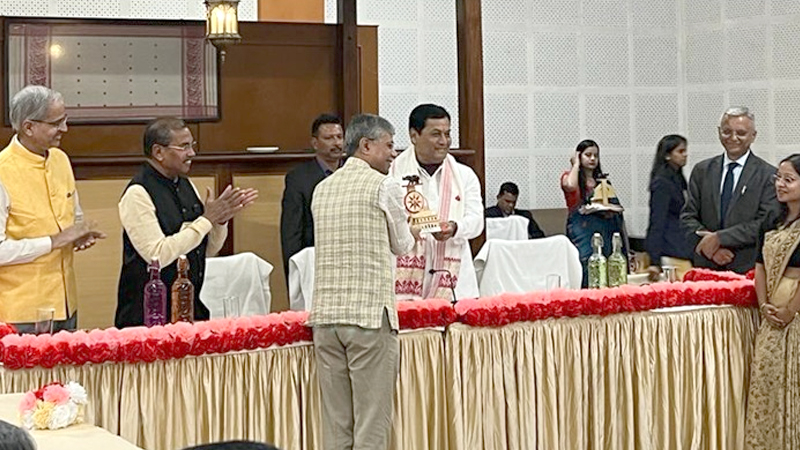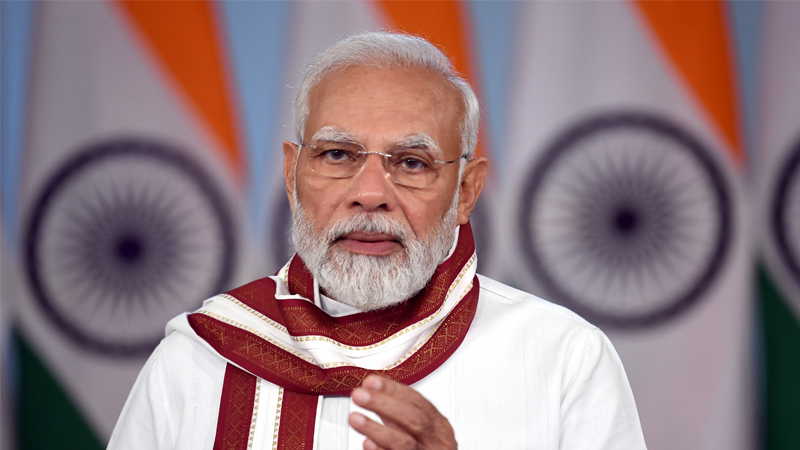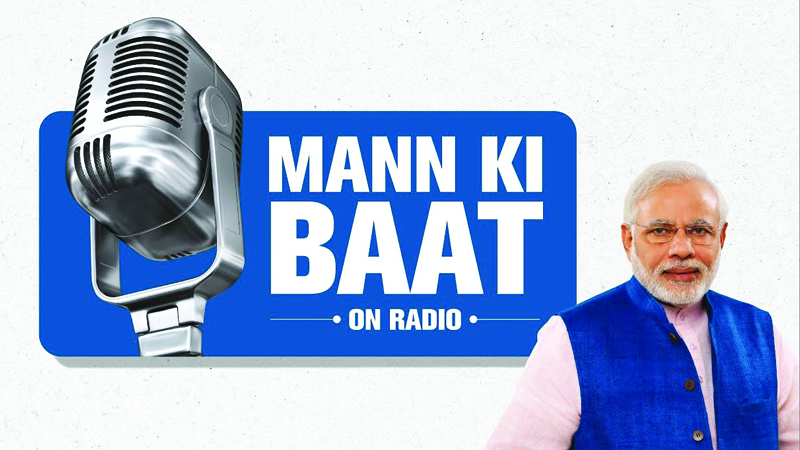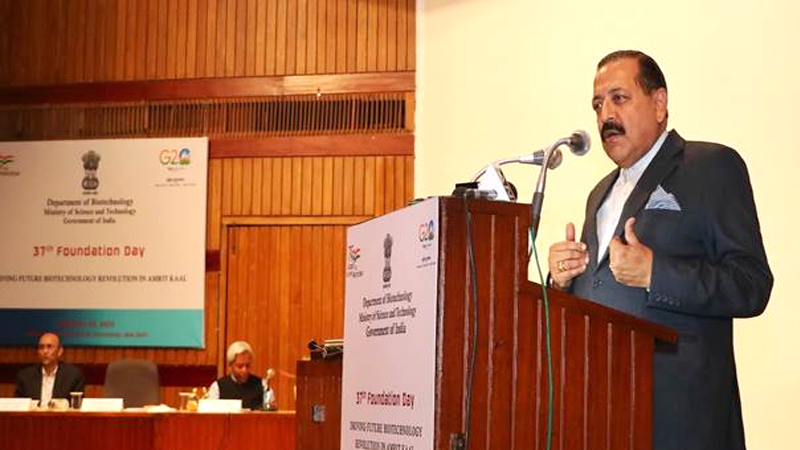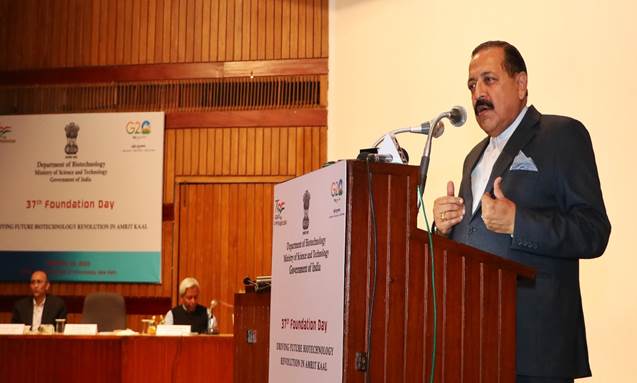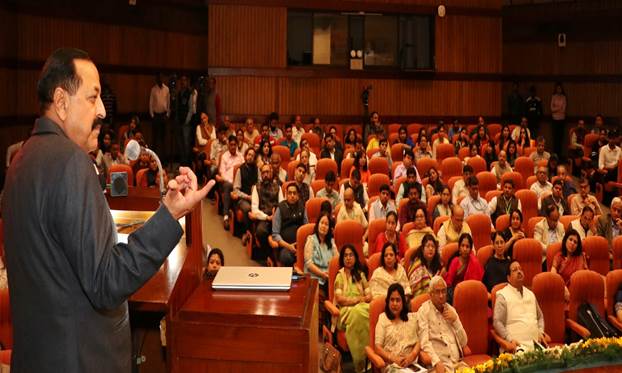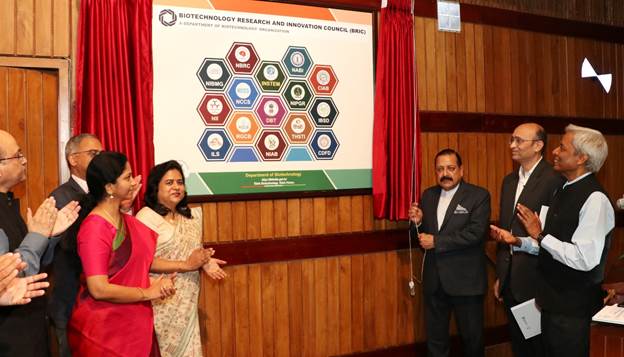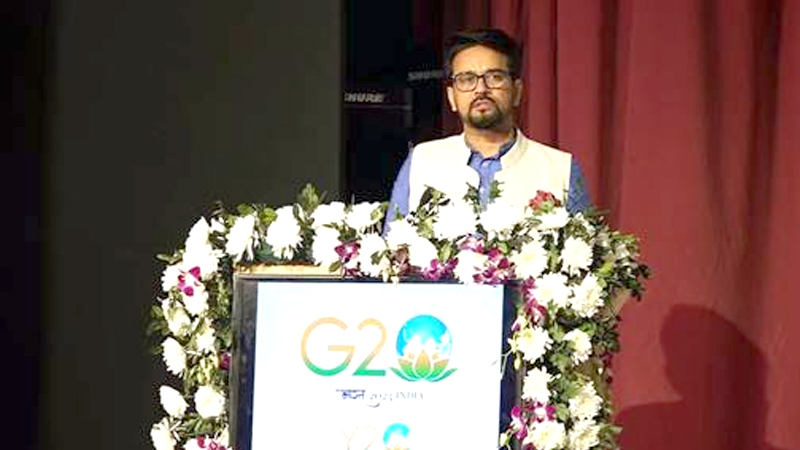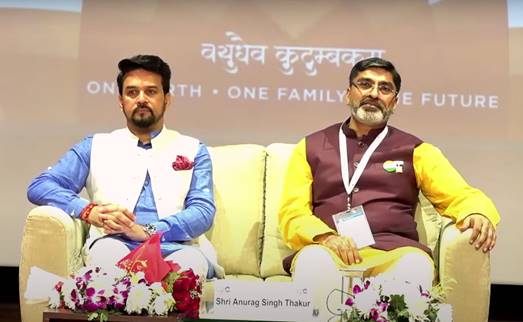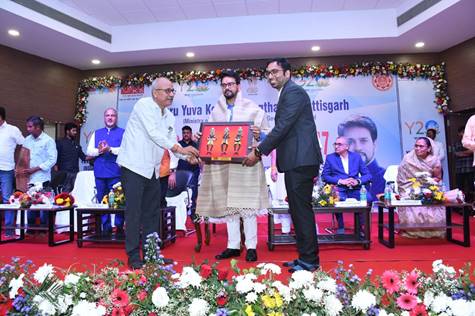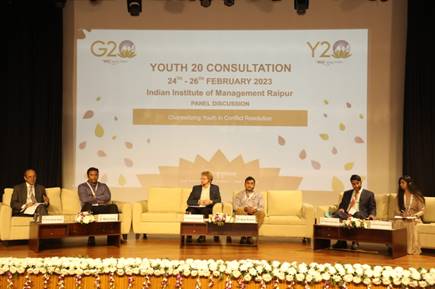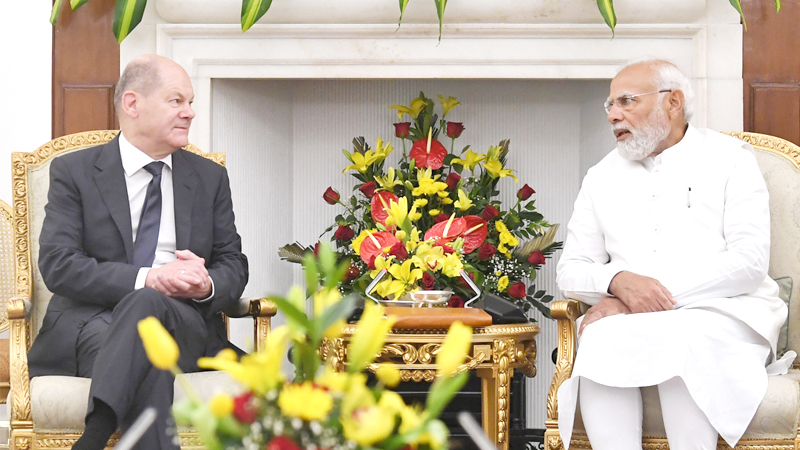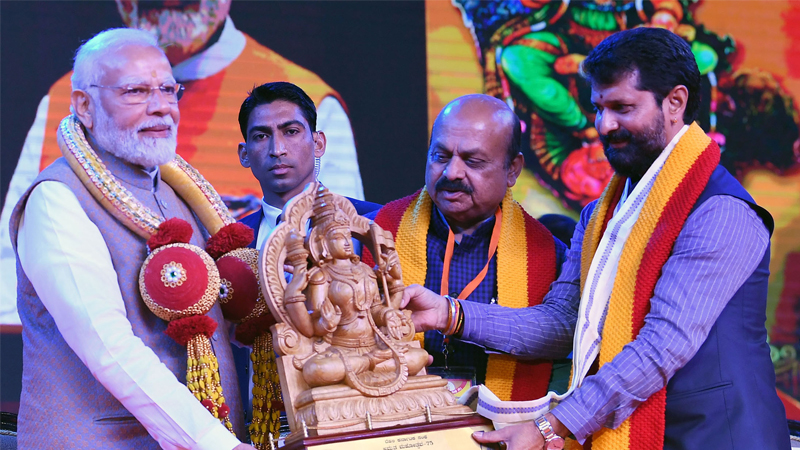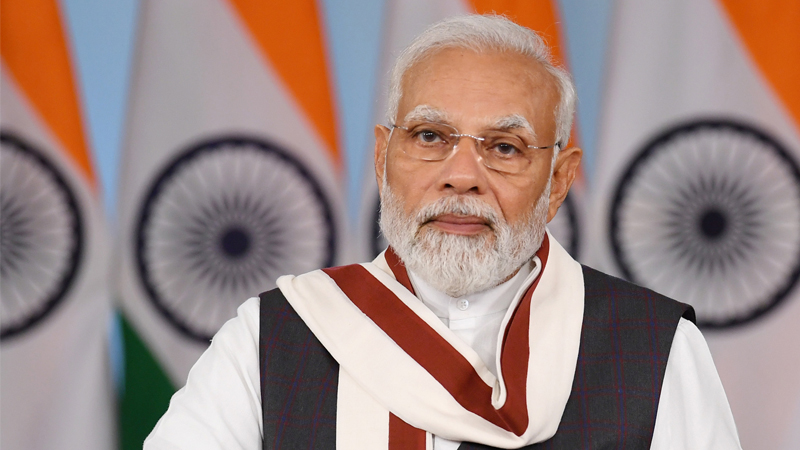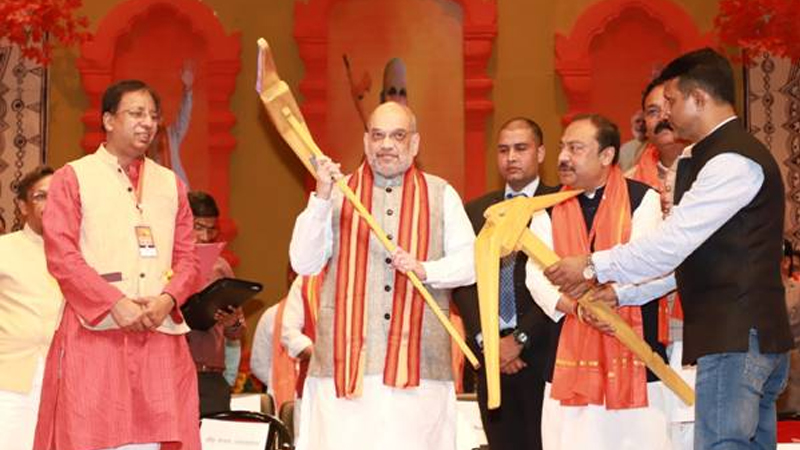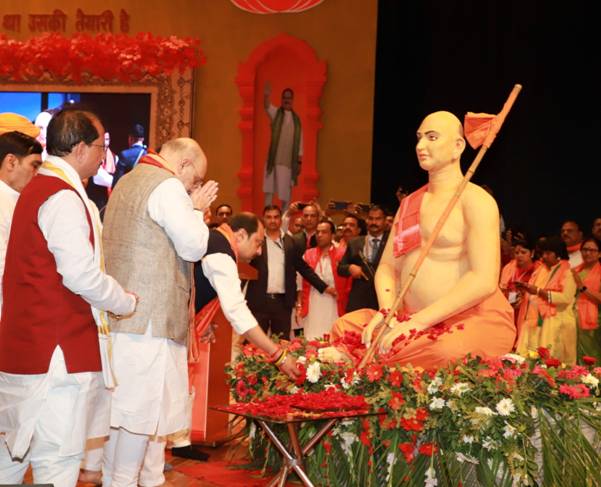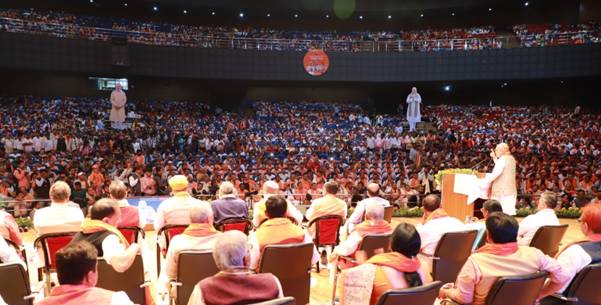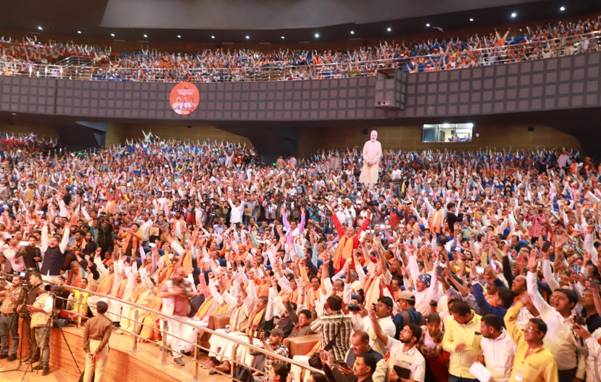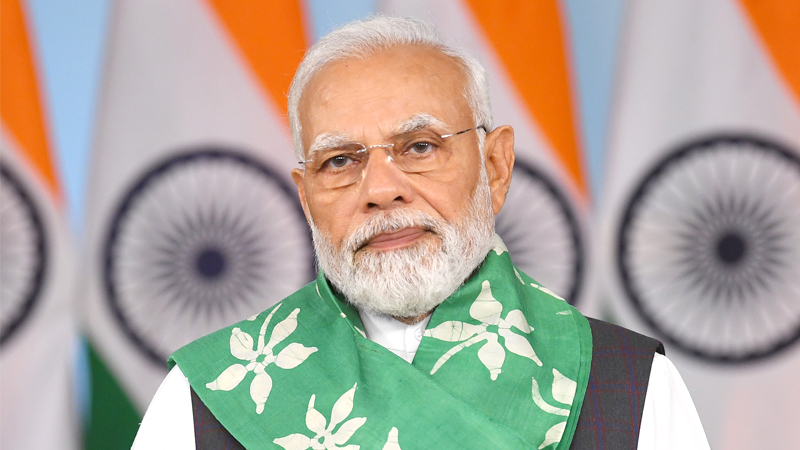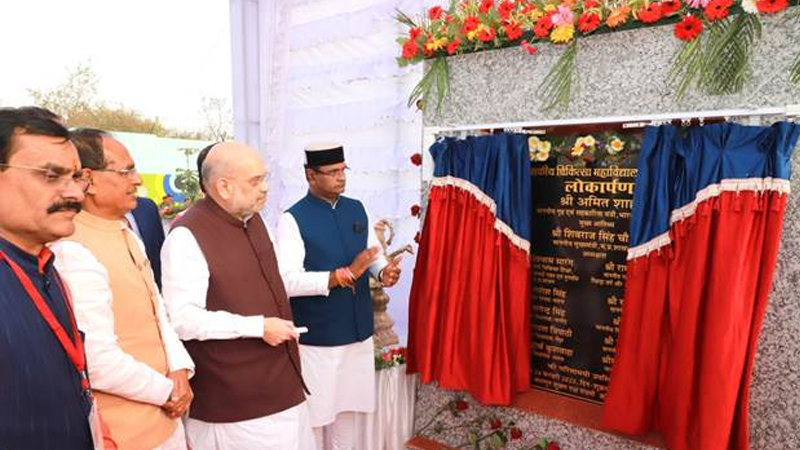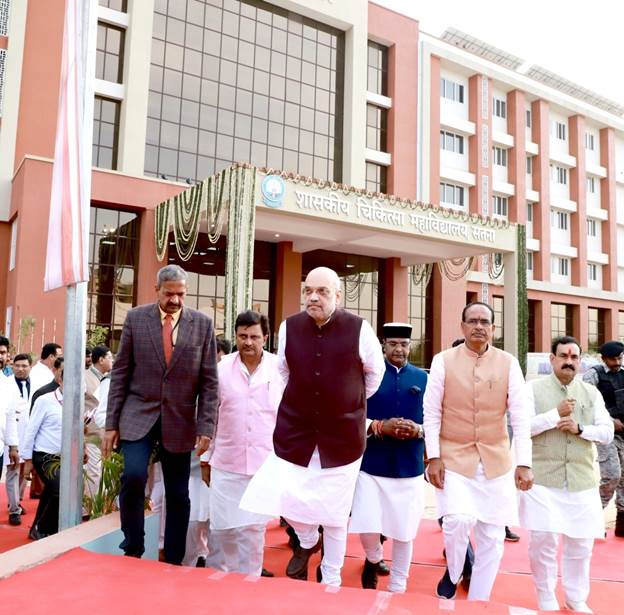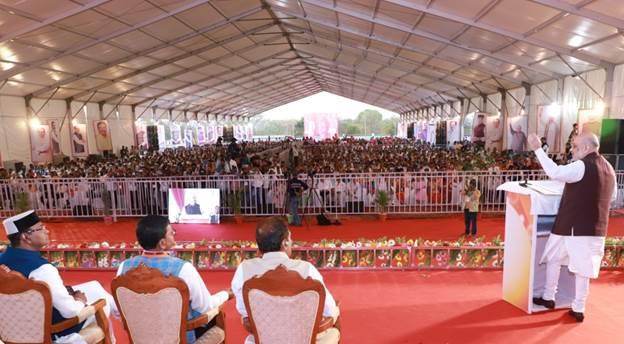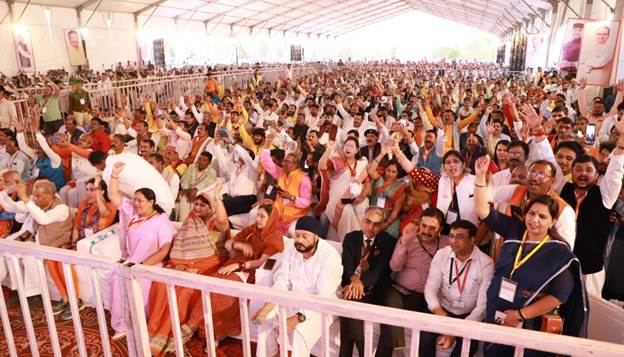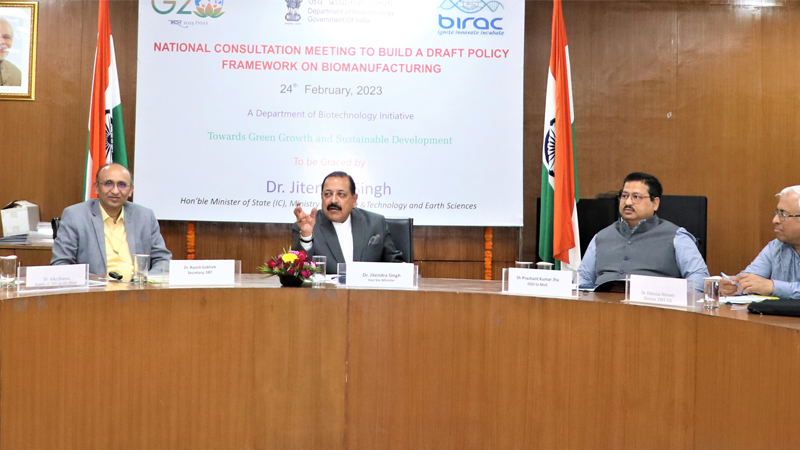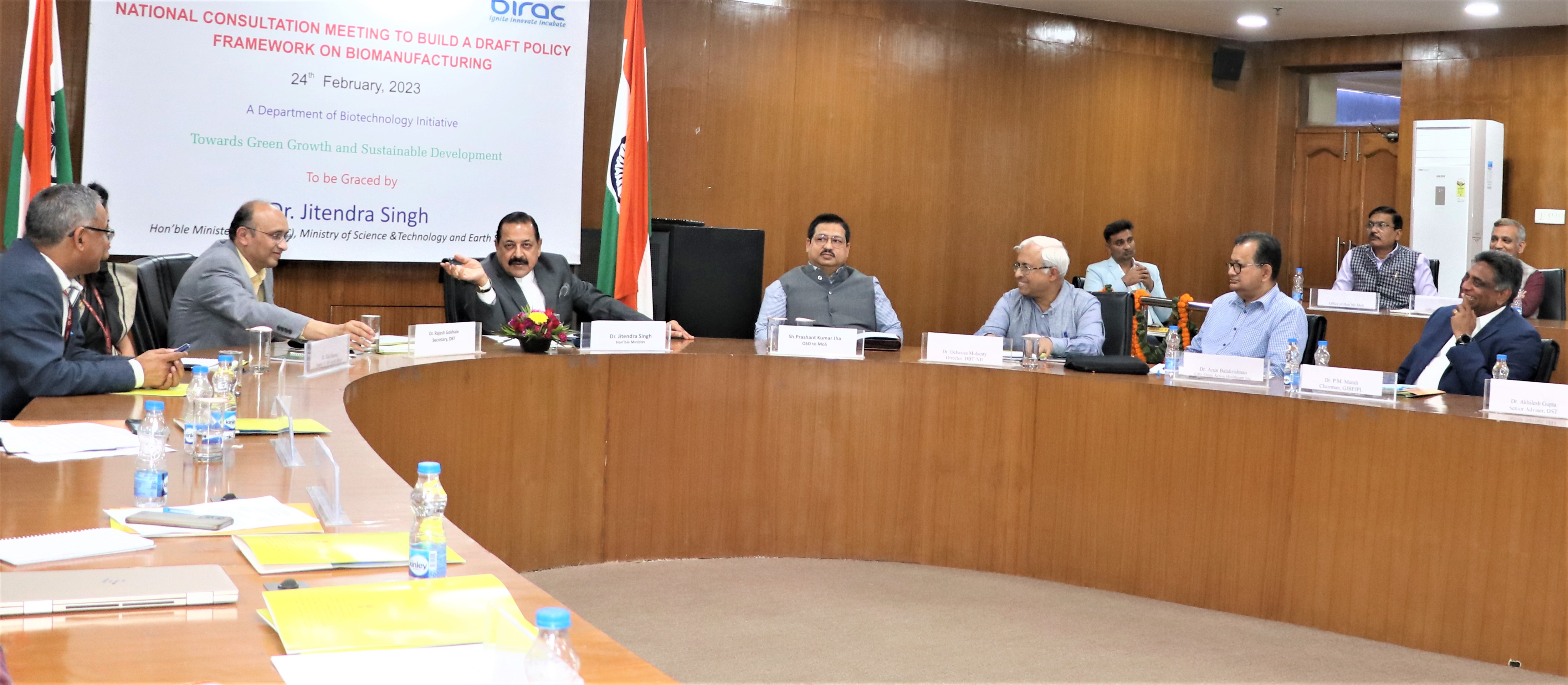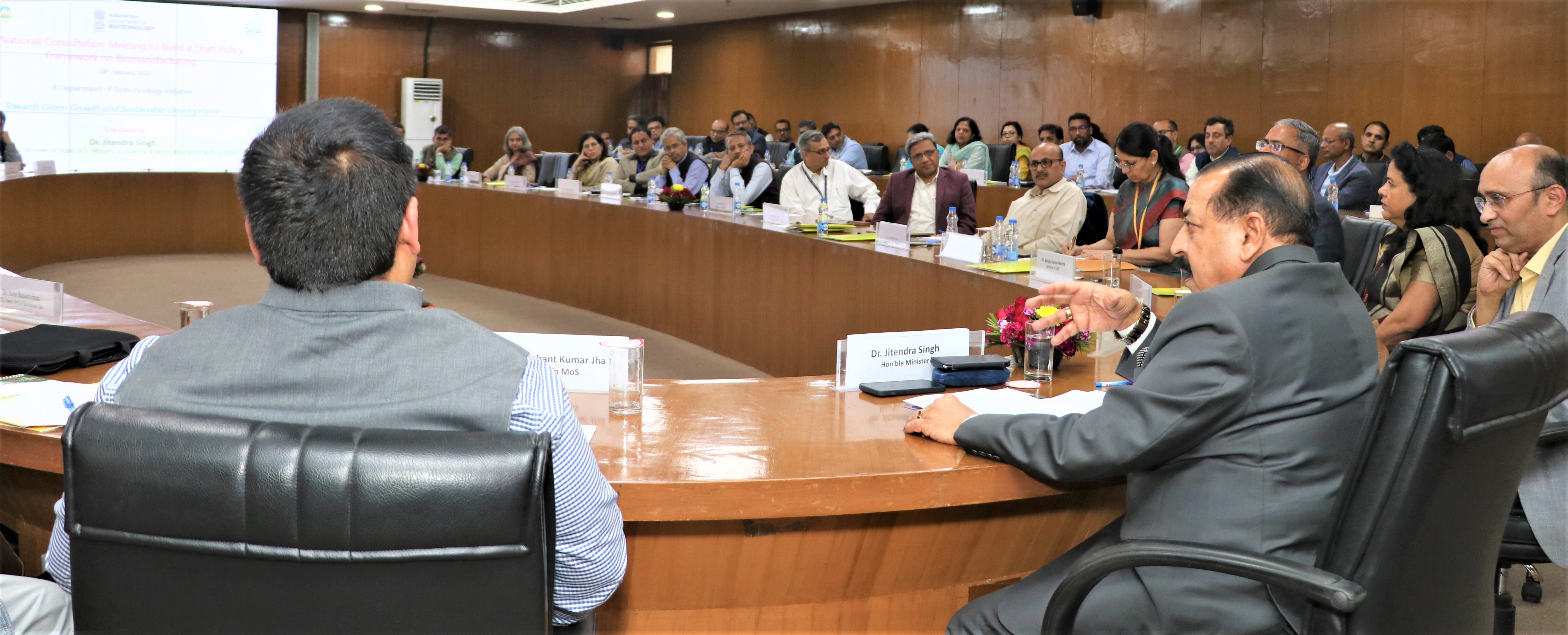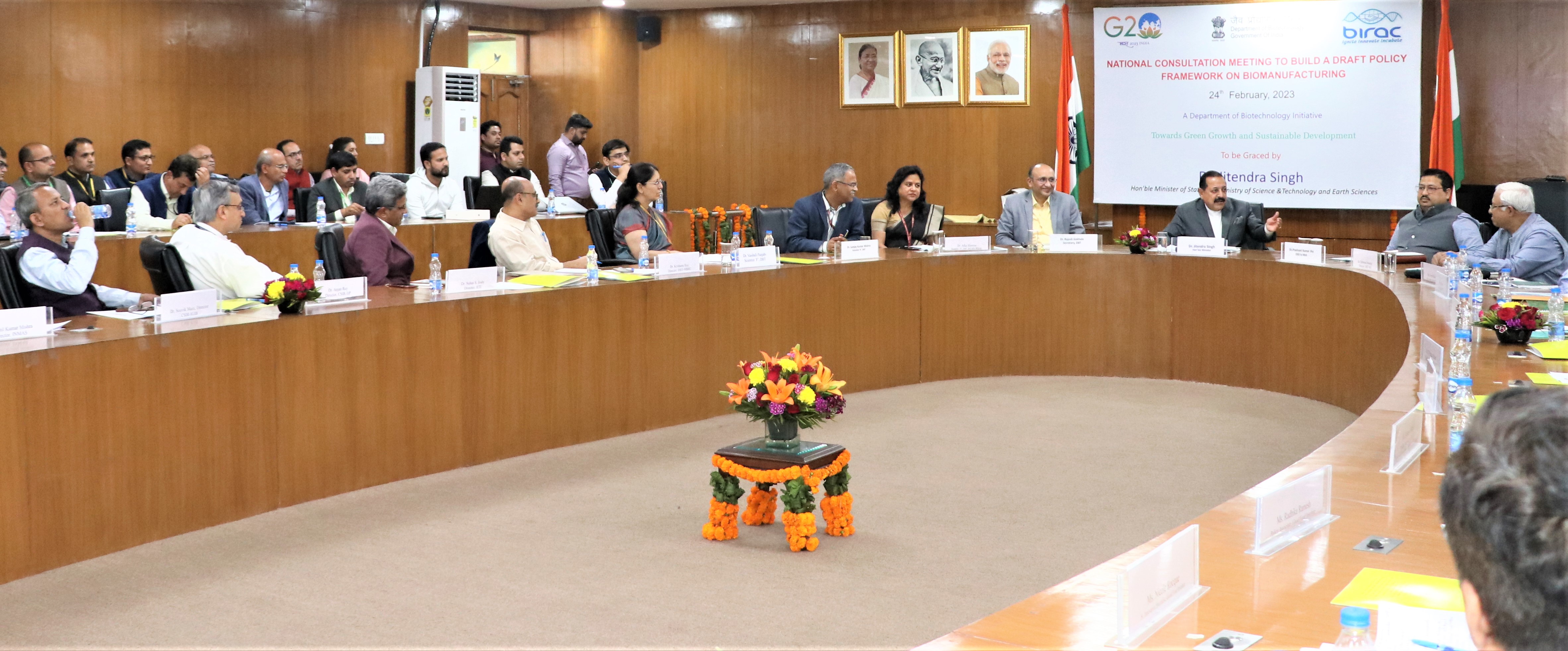My dear countrymen, Namaskar. I am feeling very happy to join you all in this 98th episode of ‘Mann Ki Baat’. In this journey towards a century, all of you have made ‘Mann Ki Baat’ a wonderful platform as an expression of public participation. Every month, in millions of messages, the ‘Mann Ki Baat’ of lots of people reaches out to me. You know the power of your mind… Similarly, how the might of the country increases with the strength of the society…this we have seen and understood in different episodes of ‘Mann Ki Baat’. And I have experienced it – have also accepted it. I remember the day when we talked about encouraging traditional sports of India in ‘Mann Ki Baat’. Immediately at that time, a wave arose in the country to join Indian Sports, to enjoy them, to learn them. In ‘Mann Ki Baat’, when we referred to Indian toys, the people of the country promoted this too, readily. Nowadays, Indian toys have become such a craze that their demand has increased even in foreign countries. When we spoke of Indian genres of story-telling in ‘Mann Ki Baat’, their fame also reached far and wide. People started getting attracted towards the Indian story-telling genre, more and more.
Friends, you might remember that on Sardar Patel’s birth anniversary i.e. ‘Unity Day’, we talked of three competitions in ‘Mann Ki Baat’. These competitions, ‘Geet’ – Patriotic Songs, ‘Lullabies’ and ‘Rangoli’ were associated with it. I am glad to inform you, that more than 5 lakh people from more than 700 districts across the country have participated in this enthusiastically. Children, adults and the elderly enthusiastically participated and entries have been sent in more than 20 languages. Many many congratulations to all the participants in these competitions from my side. Each one of you, in your own right is a champion, an art seeker. You all have shown how much love you have for the diversity and culture of your country.
Friends, today on this occasion it is very natural for me to remember Lata Mangeshkar ji, Lata Didi. Because on the day that this competition had started, Lata Didi had urged the countrymen by tweeting that they must join this endeavour.
Friends, in the lullaby writing competition, the first prize has been won by B.M. Manjunath ji of Chamrajnagar district in Karnataka. He received this award for his lullaby ‘Malagu Kanda’ written in Kannada. He got the inspiration to write this from the lullabies sung by his mother and grandmother. Listen to it, you will enjoy it too.
[Kannada Sound Clip (35 seconds)]
“Sleep, sleep, baby,
Sleep, my smart darling,
The day is gone and it is dark,
The goddess of sleep will arrive,
From the garden of the stars,
Will carve out dreams for you!
Go to sleep, Go to sleep,
Jojo…jo..jo..
Jojo…jo..jo..”
Dinesh Gowala, a resident of Kamrup district in Assam, has won the second prize in this competition. The lullaby he has written bears a reflection of the popular craft of the artisans who make clay and pot vessels locally.
[Assamese Sound Clip (35 seconds)]
Brother Potter has brought a bag,
Say, What’s in the bag?
Opened it and saw the potter’s bag,
There was a lovely bowl in the bag!
Our doll asked the potter,
What is this little bowl!
Just like songs and lullabies, the Rangoli Competition also turned out to be quite popular. The participants made many a beautiful Rangoli, one better than the other. In this, the winning entry proved to be that of Kamal Kumar from Punjab. He made very beautiful Rangoli of Netaji Subhash Chandra Bose and Amar Shaheed Veer Bhagat Singh. Sachin Narendra Avsari ji of Sangli Maharashtra, in his Rangoli, has depicted Jallianwala Bagh, the massacre and the bravery of Shaheed Udham Singh. Gurudutt Vantekar, a resident of Goa, made a Rangoli on Gandhiji, while Malathiselvam ji of Puducherry also focused on many great freedom fighters. The winner of the patriotic song competition, T. Vijay Durga ji is from Andhra Pradesh. She had sent her entry in Telugu. She has been greatly inspired by Narasimha Reddy Garu ji, the famous freedom fighter of her region. Do listen to this part of Vijay Durga ji’s entry
[Telugu Sound Clip (27 seconds)]
The Sun of Renadu State,
O brave Narasimha!
You are the seedling of the Indian Freedom Struggle and the restraint!
Look at the unjust and the autocratic repression tendencies of the British.
Your blood ignited and fire sprang up!
The Sun of Renadu State,
O brave Narasimha!
After Telugu, I will now make you listen to a clip in Maithili. It has been sent by Deepak Vats ji. He has also won a prize in this competition.
[Maithili Sound Clip (30 seconds)]
India is the pride of the world brother,
Our country is great
Surrounded by seas on three sides,
Kailash is strong in the north,
Ganga, Yamuna, Krishna, Kaveri,
Koshi, Kamla Balan,
Our country is great brother
Our life sustenance is our Tricolour!
Friends, I hope you have liked them. The list of such entries that entered the competition is very long. While visiting the website of the Ministry of Culture, do watch and listen to them with your family – you will be greatly inspired.
My dear countrymen, whether it is about Banaras or the Shehnai or Ustad Bismillah Khan ji, it is natural that my attention will be drawn in that direction. A few days ago, ‘Ustad Bismillah Khan Yuva Puraskar’ were conferred. These awards were given away to emerging, talented artists in the field of music and performing arts. These, along with the rising popularity of the art and music world are also contributing in their enrichment. These also include artists who have breathed new life into those instruments, whose popularity was decreasing with time. Listen carefully now to this tune.
[Sound Clip (21 seconds) Instrument- ‘Sursingar’, Artist -Joydeep Mukherjee]
Do you know what instrument this is? It could be possible that you may not be aware of it! The name of this musical instrumental mantra is ‘Sursingar’ and this tune has been composed by Joydeep Mukherjee. Joydeep ji is among the youth honored with the Ustad Bismillah Khan Award. It had become rare to hear tunes of this instrument since the late 50’s and 60’s. But, Joydeep is persevering towards making the Sursingar popular once again. Similarly, the efforts of sister Uppalpu Nagmani ji are also very inspiring, who has been awarded in the category of Carnatic Instrumental on the Mandolin. On the other hand, Sangram Singh Suhas Bhandare ji has been awarded for Warkari Kirtan. This list doesn’t just pertain to music artistes – V Durga Devi ji has won this award for ‘Karakattam’, an ancient dance form. Another winner of the award, Raj Kumar Nayak ji, organized the Perini Odissi, which lasted for 101 days in 31 districts of Telangana. Today, people have started knowing him by the name of Perini Rajkumar. Perini Natyam, a dance dedicated to Lord Shiva, was quite popular during the Kakatiya Dynasty. The roots of this dynasty are still associated with Telangana. There is another award winner – Saikhom Surchandra Singh. He is known for his mastery in making Meitei Pung Instrument. This instrument has connections with Manipur. Pooran Singh is a Divyang Artist, who is popularizing various Music Forms such as – Rajula-Malushahi, Nyuli, Hudka Bol, Jagar. He has also prepared many audio recordings related to them. The talented folk music artist of Uttarakhand, Puran Singh ji has also won many awards. Due to the limitation of time, I may not be able to talk about all the awardees here, but I am sure that you will definitely read about them. I hope that all these artists will continue to inspire everyone at the grassroots towards making performing arts more popular.
My dear countrymen, in our fast moving country, the power of Digital India is visible in every corner. Different apps play a big role in taking the power of Digital India to every home. There is one such App, E-Sanjeevani. Through this App Tele-consultation, that is, while sitting far away, through video conference, you can consult a doctor about your illness. Till now, the number of tele-consultants using this app has crossed the figure of 10 crores. You can imagine!… 10 crore Consultations through video conference….An amazing bond between patient and doctor – this is a big achievement. For this achievement, I congratulate all the doctors and patients who have availed of this facility. This is a living example of how the people of India have made technology a part of their lives. We have seen that in the time of Corona, E-Sanjeevani App has proved to be a great boon for the people. It also occurred to me…. Why not talk about this in ‘Mann Ki Baat’ with a doctor and a patient, communicate and convey the matter to you all!. Let us try to know how effective Tele-consultation has been for the people. With us is Dr. Madan Mani ji from Sikkim. Dr. Madan Mani hails from Sikkim itself, but did his MBBS from Dhanbad and then did his MD from Banaras Hindu University. He has provided tele-consultation to hundreds of people in rural areas.
Prime Minister: Namaskar… Namaskar Madan Mani ji.
Dr. Madan Mani: Ji Namaskar Sir.
Prime Minister: This is Narendra Modi speaking!
Dr. Madan Mani: Yes… Yes Sir.
Prime Minister: You have studied in Banaras.
Dr. Madan Mani: Yes, I have studied in Banaras, Sir
Prime Minister: Your medical education took place there.
Dr. Madan Mani: Yes… Yes.
Prime Minister: So, did you ever go to see the Banaras of that time when you were there earlier and the changed Banaras of today?
Dr. Madan Mani: Ji Prime Minister ji, I have not been able to visit since I have come back to Sikkim, but I have heard that a lot has changed.
Prime Minister: So how many years have passed since you left Banaras?
Dr. Madan Mani: I have left Banaras since 2006 sir.
Prime Minister: O… then you must go.
Dr. Madan Mani: Yes… Yes.
Prime Minister: Well, I called because you are providing great services of teleconsultation to the people of Sikkim, living in remote mountains.
Dr. Madan Mani: Ji
Prime Minister: I would like to share your experience with the listeners of ‘Mann Ki Baat’.
Dr. Madan Mani: Yes.
Prime Minister: Tell me, how was the experience?
Dr. Madan Mani: It was a great experience Prime Minister ji…The fact is the nearest PHC in Sikkim… To go there also people have to board a vehicle and carry at least one or two hundred rupees. And whether a doctor would be available… this is also a problem. So through Tele Consultation, we connect directly with people….with people from faraway places. The CHOs of Health & Wellness Centres get them connected with us. And they tell us the reports of their old ailments, their present condition…. everything.
Prime Minister: That means you transfer the documents!
Dr. Madan Mani: Yes…Yes… We also transfer documents and if they are unable to transfer, they read out and tell us.
Prime Minister: The doctor of the Wellness Center there conveys!
Dr. Madan Mani: Yes, the CHO who lives in the Wellness Center, Community Health Officer.
Prime Minister: And the one who is a patient tells you about his difficulties directly.
Dr. Madan Mani: Yes, the patient also tells us about his difficulties. Then after seeing the old records, if we want to know any new things. For example, one has to auscultate someone’s chest… if his feet are swollen or not? If the CHO has not seen it, then we tell him to go and see whether there is swelling or not, look at the eyes, whether he has anaemia or not, if he has cough, then auscultate the chest and find out whether there are sounds there or not.
Prime Minister: Do you talk through Voice Call or do you also use Video Call?
Dr. Madan Mani: Yes, we use Video Call.
Prime Minister: So you see the patient as well.
Dr. Madan Mani: Can see the patient also, sir.
Prime Minister: What feeling does the patient get?
Dr. Madan Mani: The patient likes it because he can see the doctor closely. He is confused whether his medicine has to be increased or decreased, because most of the patients in Sikkim are of diabetes and hypertension and how far he will have to go to find a doctor to change the medicine for diabetes and hypertension. But through Tele Consultation, it is available there and medicine is also available through Free Drugs initiative in the Health & Wellness Center. So, the patient avails of the medicine from there itself.
Prime Minister: Well Madan Mani ji, you know that the patient has a tendency that until the doctor comes; until the doctor sees him; he is not satisfied and the doctor also feels that he will have to see the patient. Now since all the consultations there are done through Telecom, what does the doctor feel; what does the patient feel?
Dr. Madan Mani: Ji… we also feel that if the patient feels that he should see the doctor, then whatever things we want to see, we, by speaking to CHO, in the video only, we ask to see. And sometimes, by coming close to the patient in the video itself, the problems he is facing, if someone has a skin problem, then he shows us through the video itself. So those people remain satisfied.
Prime Minister: And later after treating him, does he get satisfaction… what does he feel? Are patients getting well?
Dr. Madan Mani: Yes, I get a lot of satisfaction. We also get satisfaction sir. Because I am currently in the health department and simultaneously do tele-consultation… it is a very good, pleasant experience for me to see the patient along with the file.
Prime Minister: On an average, how many patients would be there through Tele Consultation cases?
Dr. Madan Mani: So far I have seen 536 patients.
Prime Minister: Oh… that means you have mastered it a lot.
Dr. Madan Mani: Yes, it feels good.
Prime Minister: Okay, I wish you all the best. By using this technology, you are doing such a great service to the people living in the remote forests and mountains of Sikkim. And it is a matter of joy that such a good use of technology is being made even in the far-flung areas of our country. Fine… many congratulations to you from my side.
Dr. Madan Mani: Thank You!
Friends, it is clear from the words of Dr. Madan Mani how E-Sanjeevani App is helping them. After Dr. Madan ji, we now join another Madan ji. This is Madan Mohan Lal ji, a resident of Chandauli district of Uttar Pradesh. Now it is also a coincidence that Chandauli is also adjacent to Banaras. Come, let us know from Madan Mohan ji what his experience as a patient regarding E-Sanjeevani has been!
Prime Minister: Madan Mohan ji, Pranam!
Madan Mohan ji: Namaskar, Namaksar Sir!
Prime Minister: Namaskar! Well, I have been told that you are a diabetic patient.
Madan Mohan ji: Yes…yes
Prime Minister: And you take help of technology regarding your illness through teleconsultation!
Madan Mohan ji: Ji..ji
Prime Minister: As a patient, I want to listen to your experiences, so that I would like to convey to our countrymen how the people living in our villages can use today’s technology. Tell me, how do you do it?
Madan Mohan ji: It is like this Sir, hospitals are far away and when I got diabetes, I had to travel 5-6 kms away to get treatment done…to consult on it. And since the arrangement has been made by you, means that I go now, I am examined, it also makes us talk to doctors from outside and also provides us medicines. It is of great benefit to me and other people are also benefited by it.
Prime Minister: So every time is it the same doctor that sees you or the doctors keep changing?
Madan Mohan ji: Since they don’t understand, they show it to the doctor. It talks to us and makes us talk to another doctor.
Prime Minister: And the guidance that doctors give you, you get full benefit from it?
Madan Mohan ji: We are benefited. We have a great benefit through that. And the people of the village also benefit from it. Everyone there asks that brother, we have BP, we have sugar, test, check, tell us about the medicine. And earlier they used to go 5-6 kilometres away… there used to be long queues… there used to be queues in Pathology. There used to be a loss of an entire day’s time.
Prime Minister: Meaning, your time is also saved.
Madan Mohan ji: And money was also wasted and here all services are being done free of cost.
Prime Minister: Well, when you see the doctor in person, in front of you, a trust is formed. Okay…here’s a doctor, he has checked my pulse, my eyes… he has also checked my tongue. So it’s a different feeling. Now if they do Tele Consultation, do you get the same satisfaction?
Madan Mohan ji: Yes, there is satisfaction. I feel that they feel our pulse, check with a stethoscope, and I feel very happy that well…Such a good arrangement has been made by you… We earlier had to go there with difficulty, paying for transport fare…Had to line up in a queue there…Now, we are getting all the facilities sitting at home.
Prime Minister: Well, Madan Mohan ji, I wish you all the best. Even at this stage of age, you have learned technology, you use technology. Tell others too so that their time is saved… money too is saved and through whatever guidance they get, medicines can also be used in a better way.
Madan Mohan ji: Yes, of course!
Prime Minister: Fine, my best wishes to you Madan Mohan ji.
Madan Mohan ji: Sir, you have made Banaras Kashi Vishwanath Station, developed it. Our congratulations to you on that!
Prime Minister: I thank you. What have we made? The people of Banaras have made Banaras. Otherwise, we have been called by Mother Ganga to serve Mother Ganga, that’s all, nothing else. Ok ji, many best wishes to you. Pranam ji
Madan Mohan ji: Namaskar Sir!
Prime Minister: Namaskar ji!
Friends, E-Sanjeevani is becoming a life-saving app for the common man of the country, for the middle class, for the people living in hilly areas. This is the power of India’s digital revolution. And today we are seeing its effect in every field. You also know the power of India’s UPI. Many countries of the world are drawn towards it. Just a few days ago, UPI-Pay Now Link has been launched between India and Singapore. Now, people of Singapore and India are transferring money from their mobile phones in the same way as they do within their respective countries. I am glad that people have started taking advantage of it. Be it India’s E-SanjeevaniApp or UPI, these have proved to be very helpful in raising the Ease of Living.
My dear countrymen, when a species of bird, a living being which is going extinct in a country is saved, it is discussed all over the world. There are many such great traditions in our country which had disappeared, had been removed from the minds and hearts of the people, but now efforts are being made to revive them with the power of public participation, so for discussing that… What better platform than ‘Mann Ki Baat’.
What I am going to tell you now will make you really happy…you will be proud of our heritage. Shriman Kanchan Banerjee, who lives in America, has drawn my attention to one such campaign related to the preservation of heritage. I congratulate him. Friends, this month, ‘Tribeni Kumbho Mohotshav’ was organized in Bansberia of Hooghly district in West Bengal. More than eight lakh devotees participated in it…But do you know why it is so special? It is special, since this practice has been revived after 700 years. Although this tradition is thousands of years old, but unfortunately this festival which used to take place in Tribeni, Bengal was stopped 700 years ago. It should have been started after independence, but that too could not happen. Two years ago, the festival has been started again by the local people and through ‘Tribeni Kumbho Porichalona Shomiti’. I congratulate all the people associated with its organization. You are not only keeping alive a tradition, but are also protecting the cultural heritage of India.
Friends, Tribeni in West Bengal has been known as a holy place for centuries. It finds mention in various Mangalakavya, Vaishnava literature, Shakta literature and other Bangla literary works. Various historical documents suggest that this region was once a centre of Sanskrit, education and Indian culture. Many saints consider it a holy place for Kumbh Snan on Magh Sankranti. In Tribeni, you will find many Ganga Ghats, Shiva temples and ancient buildings decorated with terracotta architecture. Kumbh Mela was organized here last year to restore the cultural heritage of Tribeni and revive the glory of Kumbh tradition. Seven centuries later, the three-day Kumbh Mahasnan and the fair have infused a new energy into the region. A large number of people participated in the Ganga Aarti, Rudrabhishek and Yajna that took place every day for three days. Various ashrams, mutths and akhadas were also included in the festival this time. Various genres related to Bengali traditions such as Kirtan, Baul, Godiyo Nritto, Sree-Khol, Poter Gaan, Chou-Nach, became the center of attraction in the evening programmes. This is a very commendable effort to connect our youth with the golden past of the country. There are many other such practices in India, which need to be revived. I hope that the discussion about them will definitely inspire people in this direction.
My dear countrymen, Swachh Bharat Abhiyan has changed the meaning of public participation in our country. If something related to cleanliness takes place anywhere in the country people certainly inform me about it. That’s how my attention was drawn to a cleanliness campaign by the youth of Haryana. There is a village in Haryana – Dulhedi. The youth here decided that Bhiwani city has to be made exemplary in terms of cleanliness. He formed an organization called Yuva Swachhta Evam Janseva Samiti. The youth associated with this committee reach Bhiwani at 4 in the morning. Together they run cleanliness drives at different places in the city. These people have so far cleared tons of garbage from different areas of the city.
Friends, ‘Waste to Wealth’ is also an important dimension of the Swachh Bharat Abhiyan. Kamala Moharana, a sister from Kendrapada district of Odisha, runs a self-help group. The women of this group make many things like baskets and mobile stands from milk pouches and other plastic packing materials. This is becoming a good source of income for them along with ensuring cleanliness. If we resolve, we can make a huge contribution towards a clean India. At least we all should take a pledge to replace plastic bags with cloth bags. You will see, how much satisfaction your resolution will give you, and also inspire other people.
My dear countrymen, today you and I joined together and once again talked about many inspirational topics. We listened to everything sitting with family and will now hum it throughout the day. The more we talk about the industriousness of the country, the more energy we derive. Moving with this very energy flow, today we have reached the milepost of the 98th episode of ‘Mann Ki Baat’. Holi festival is just a few days from today. Happy Holi to all of you. We have to celebrate our festival with the resolve of ‘Vocal for Local’. Don’t forget to share your experiences with me too. Till then, I take leave of you. Next time we will meet again with new topics. Thank you very much, Namaskar!


